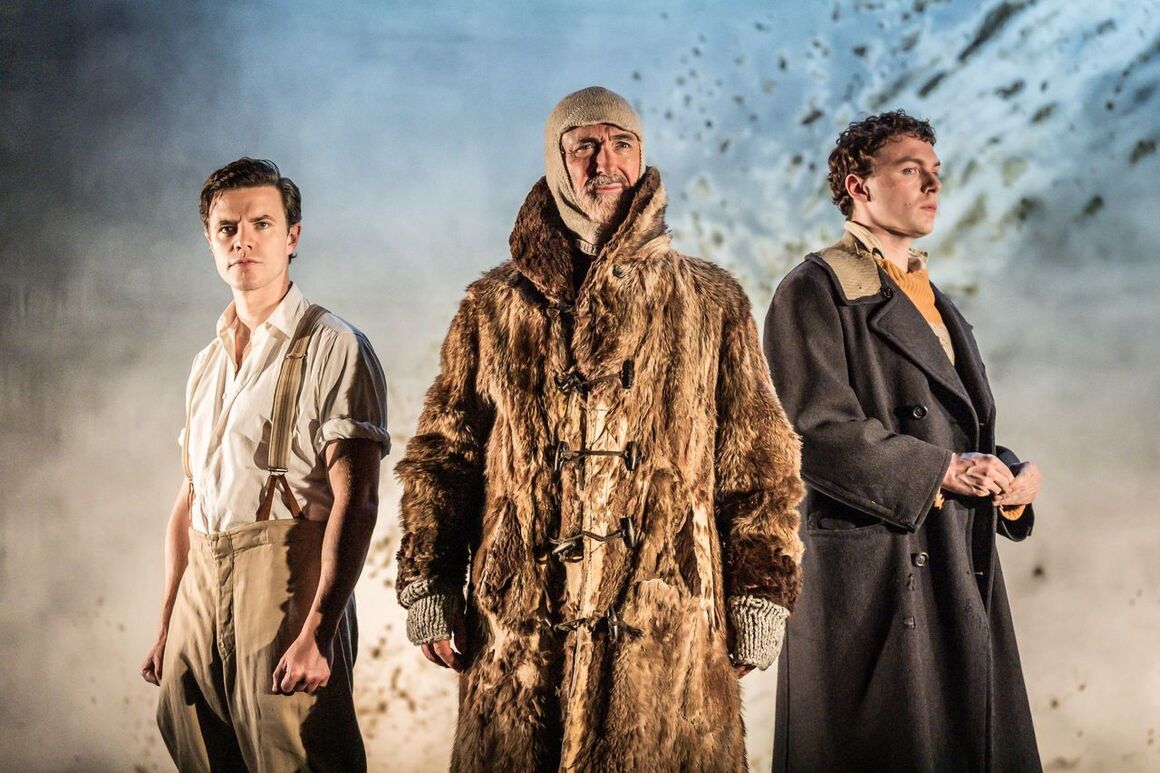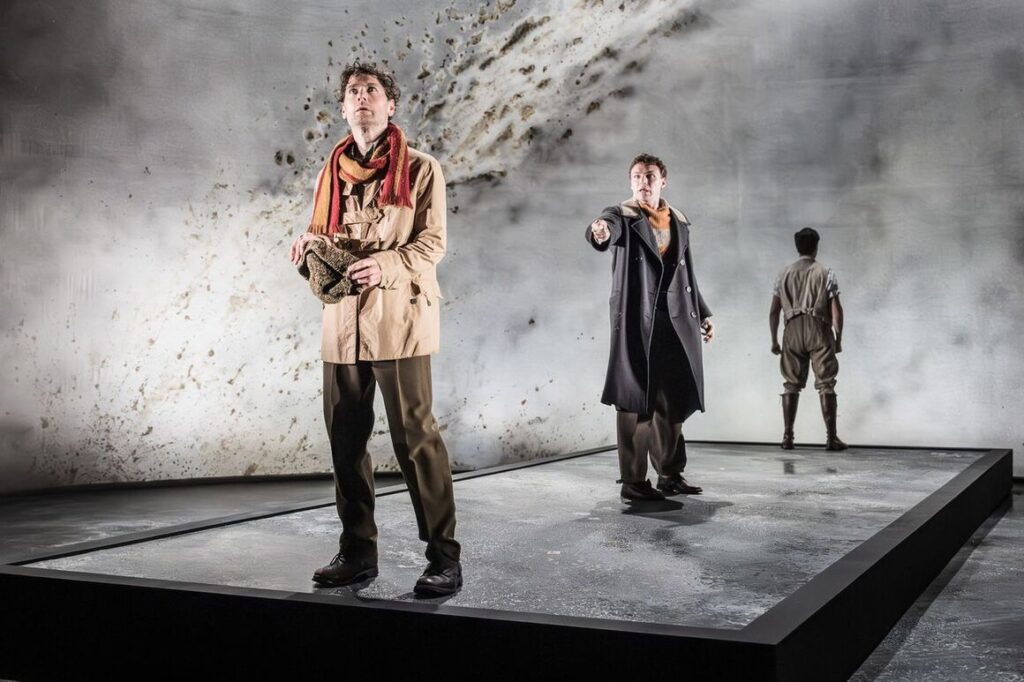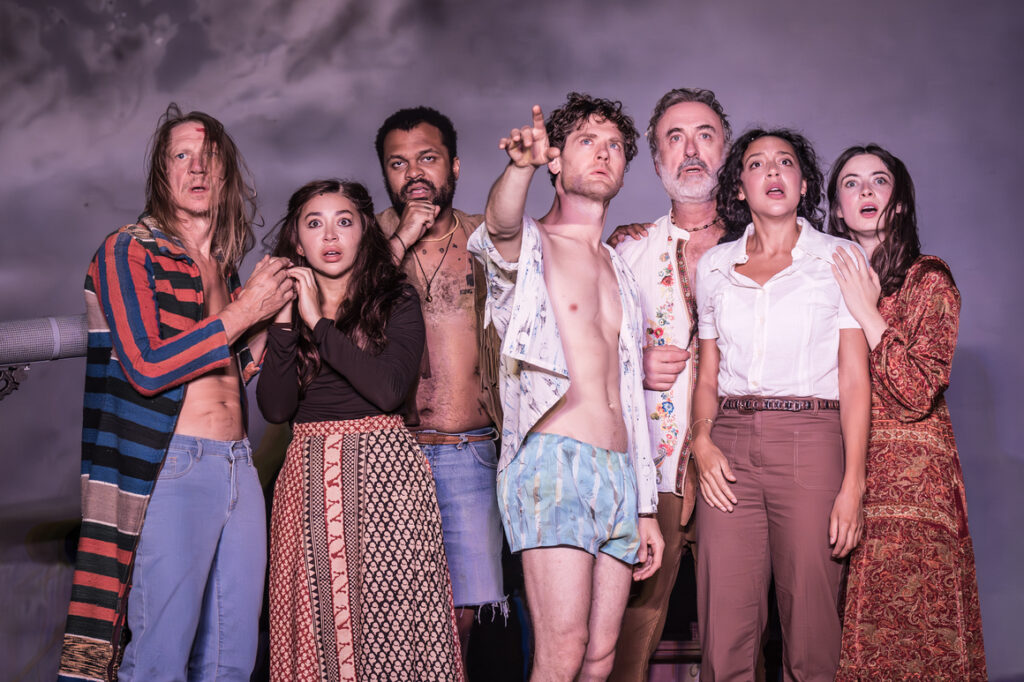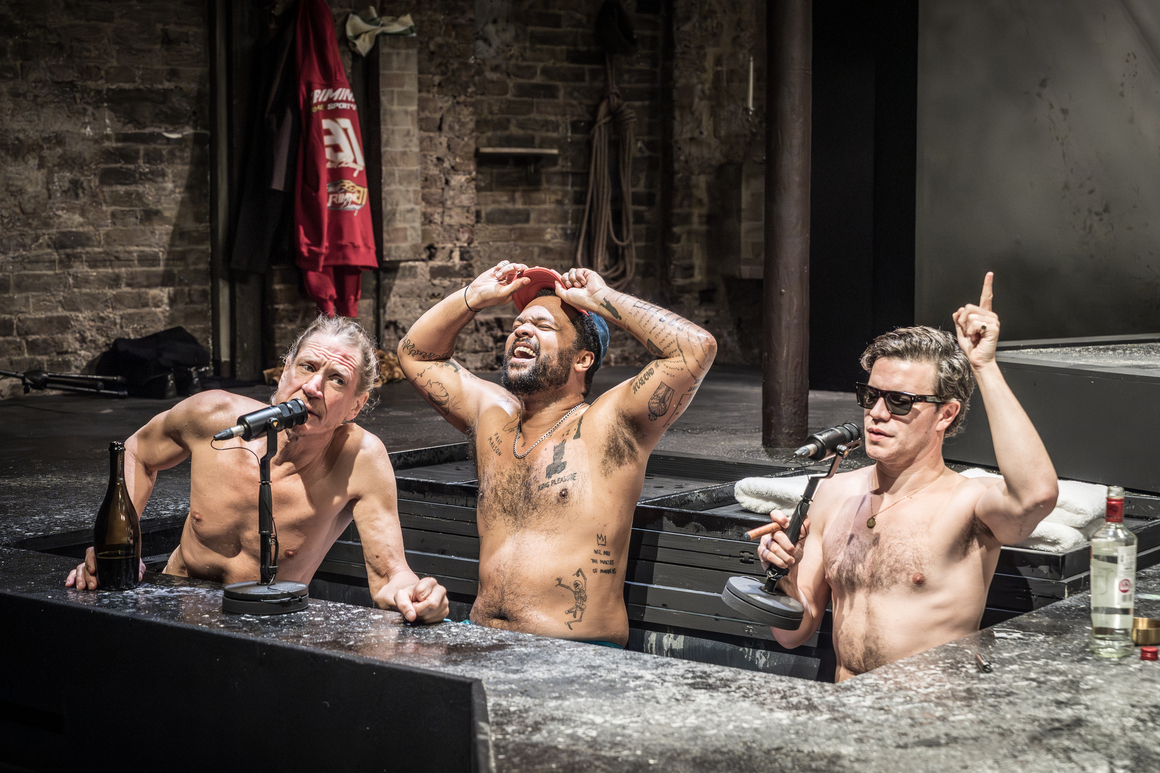Review by Simon Jenner, September 17 2025
★★★★
“Is there Anything that might unite us… That any of it was worth it.” 150 years of male solitude, three brothers whose lives stretch agelessly across it, and this is what one of them asks. Alice Birch’s Romans: A Novel directed by Sam Pritchard till October 11 explores that curious hinterland about half the population have dipped a toe or soul in. The manosphere: acclimatising your lungs to toxins only. To breathe when a sadistic headmaster or Andrew Tate tells you.
Birch has wished to write about maleness for a decade. Increasingly a screenwriter (Normal People) she’s known for formally groundbreaking plays, that when married to content produce the most innovative masterpieces of recent years. Particularly in Anatomy of a Suicide in 2017, and the two versions of {BLANK} developed with Clean Break. Most recently her version of Lorca’s The House of Bernarada Alba deconstructed patriarchy channelled through a matriarch. Now we get patriarchy neat.

Photo Credit: Marc Brenner
Over two hours 55 Birch begins with a vaguely specified late Victorian period, and progressively gestures to an identifiable period: the imperialist early 20th century, world wars, a smart post-war drinks party and after the interval the set-piece: a 1970s-style cult, followed by the 21st century and a hint of future global warming. Deliberately though it’s never as sharply-defined as Ella Hickson’s Oil where a mother and daughter age very slowly over 160 iterated years. Or Birch’s Anatomy of a Suicide, with three parallel timelines.
That subtitle “a Novel” speaks to the epic reach existing in the minds of both the male novelist’s dream of scope, and here three brothers: two sent to boarding school after their mother dies giving birth to the third. Kyle Soller’s explorer and later writer Jack; who becomes a cult leader but is a starter at ten, confronting his uncle John back from war (Declan Conlon’s laconic and damaged lieutenant, refusing to return home; later briefly father Henry); and Jerry Killick’s sadistic headmaster Poole.
Poole damages Oliver Johnstone’s Marlow, the brother Jack couldn’t rescue from Poole’s caning and who never forgives Jack. Marlow turns imperialist extractor, cutting off hands of the colonised and becoming one of the richest men in the world. Latterly he’s an influencer, apparently guru Jack’s opposite.
And there’s Stuart Thompson’s Edmund. Who refuses all these roles, takes to the road, is given a house yet wrestles with patrimony and sexuality. He’s far less present and it’s a pity. He too ends as a minor leader: a role-playing teacher, his male pupils choose foxes or badgers. There’s a wickedly delicious transformation when this parallels a 21st restaurant specialising in fresh roadkill.
Bar a flicker of her period costumes, Merle Hensel’s set for much of the first half remains stark, with a rectangular stage revolving, lit by Lee Curran. Increasingly though it’s populated by period, particularly the cult’s lunch party, and restaurant where Jack and his estranged novelist wife (now Miranda) meet. The backcloth doing duty for mountains and the epically-lit outdoors, wields a surprise. Benjamin Grant’s sound and Jasmin Kent Rodgman’s music emerge strongly in the second half but are elsewhere subtle.
Soller’s onstage almost throughout and gives of a winning boy turned man with an inner manchild kept securely hidden. As he hardens and marries (the two are related in more ways than one), he’s still contrasted with Johnstone’s out-and-out imperialist-tech-bro, the latter adding a touch of Jordan Peterson. As he slowly sloughs the Auden/Isherwood Ascent of F6 mode, the obsession with “the truly strong man”, Soller assumes the dangerous apparent equalities of 70s cult leaders: Soller’s oleaginous argument-flipping is masterly and horrible, You want to prick it, as it were

Photo Credit: Marc Brenner
Marlow’s cold sneer has less room to grow but it’s a steely performed from head to toe, with a wickedly clever way of insinuating male bonding in his latter phase, all shades. He’s hilarious as the appalling Peterson-styled influencer with his subordinate bros, expostulating on his protein diet. And exciting a chorus of shouts and other bonding rituals. Thompson, light-voiced and questioning, has in Edmund a part that’s underwritten which might have contrasted with some way forward, some pushback: but Edmund’s too damaged to attempt this. There’s moments of wonder, as at the very end of the first half looking up (a brotherly imperative throughout). It opens worlds, and you wonder how he might develop. But Edmund then vanishes till near the end.
Until the penultimate scenes, the women are only allowed a quizzicality, as Adelle Leonce’s Clarissa falls wryly for and marries Jack. Her novelist ambitions are thwarted and we’re subjected to chilling accounts of a woman “committed’ for her own good to a clinic, effectively an asylum. Emerging as Miranda a Booker-shortlisted novelist, and to a chastened, cancelled Jack, long after his glory days, Leonce is an adamantine delight, tensing and releasing her rage and controlling the narrative she unfolds: it exposes Jack. Agnes O’Casey on the other hand, as Esther a documentary-maker in the steps of her father, is initially challenging during the cult days but absorbed. Yanexi Enriquez as Rosa delights in baby-producing but enjoys a few subversive delights of her own. Enriquez delights as cult initiate Anna in sexual fantasising and challenging Esther’s’s holding-back: she’s creepily effective as someone who’s bought a gallimaufry of trad-wife roles over the century. There’s little bonding between her and Leonce in the restaurant scene: when as Waitress Enriquez tells Miranda she has a Substack Miranda dismisses her: “I can’t help you.” Birch in a flash declares there’s no mild fiction of mutual aid in a male literary world.
Oliver Huband as refugee Emilio and other roles impresses as someone caught up affably in a maleness that’s not any of his characters; and continually plays low-status. Jerry Killick, after his sadistic caning’s done appears as a range of comedically alarming characters: howling as someone who won’t submit in the cult, and emerging as the chef with roadkill.
Dramatising masculinity here illuminates some, if not all of its current toxins. If there’s a slightly amorphous feel to the early narrative, this does firm up. Sometimes, as she herself shows, clear dates punctuating long periods release sharp aromas: and evoke the timeless. There’s not a nodding moment, and over three hours Birch, creatives and cast realise a riveting tableau of truly page-turning reach flickered through, as it were. It takes time to settle in the mind, and one doesn’t quite root for any of the characters; which is almost inevitable. Perhaps a touch of nature is missing, but that’s exactly the point. The most absorbing play of the season so far.

Photo Credit: Marc Brenner
Movement Director Hannes Langolf Casting Director Amy Ball CDG, Costume Supervisor Jackie Orton, Wigs, Hair and Make-Up Supervisor Sophia Khan, Fight Director Bret Yount, Voice Coach Michaela Kennen, Assistant Director Neetu Singh, Associate Sound Designer Raffaela Pancucci.


